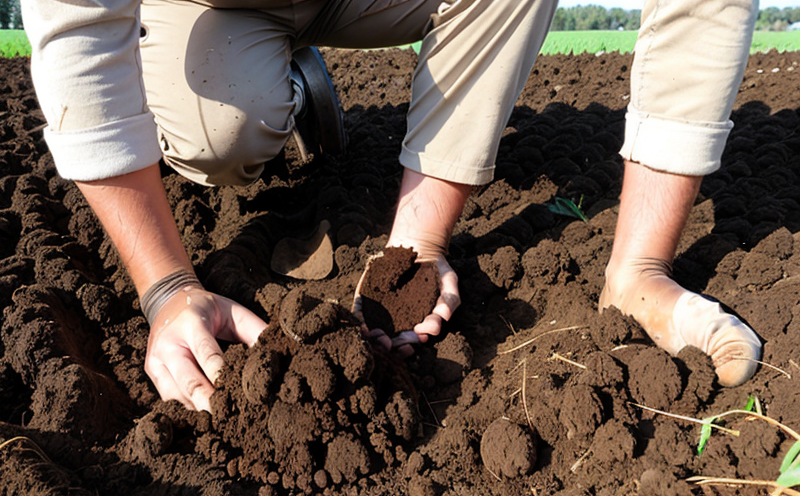Soil Iron Content Testing
The testing of soil iron content is a critical component in understanding and optimizing agricultural productivity. Iron is one of the essential nutrients required by plants to carry out various metabolic functions, including chlorophyll synthesis, respiration, and photosynthesis. Soil iron content can vary widely depending on factors such as climate, pH levels, and the parent material from which the soil was formed. Thus, accurate testing ensures that farmers and agronomists have precise information about their soil's nutrient availability.
Our soil iron content testing service leverages advanced analytical techniques to measure iron concentration in soil samples with high precision. This includes methods such as inductively coupled plasma optical emission spectrometry (ICP-OES) or atomic absorption spectroscopy (AAS). These tests are ISO/IEC 17025 compliant, ensuring that the results meet stringent quality standards.
For agricultural applications, understanding soil iron content is vital for several reasons. Firstly, it helps in diagnosing potential deficiencies or excesses of iron, which can negatively impact plant health and crop yields. Secondly, accurate testing allows for targeted amendments to improve soil fertility, leading to more efficient use of resources and reduced environmental impacts. Lastly, this information supports the development of sustainable farming practices by providing insights into how different management strategies affect soil quality.
Sample preparation is an integral part of our iron content testing process. Soil samples are collected from representative locations within fields or plots, ensuring that they reflect the overall condition of the area being tested. Samples are then air-dried and ground to a fine powder before analysis. This ensures consistent results across multiple samples taken from the same location.
The analytical equipment used in our laboratory adheres strictly to international standards such as ISO 17025 for method validation, ensuring that all tests follow rigorous protocols. Our team of experts uses these instruments to analyze soil iron content accurately and consistently.
Once analyzed, we provide detailed reports outlining the concentration levels of iron found in each sample. These reports are invaluable tools for making informed decisions regarding fertilization practices or other interventions aimed at enhancing soil quality.
Benefits
The benefits of knowing your soil's iron content extend far beyond simply having accurate data; they directly translate into improved agricultural performance and sustainability. By identifying areas where iron levels are either too high or insufficient, farmers can implement corrective measures more effectively, reducing the need for unnecessary inputs while maximizing yield potential.
For instance, if a field shows signs of iron deficiency (chlorotic leaves), applying appropriate amendments could reverse these symptoms quickly. Conversely, excessive iron in certain soils might indicate a need to adjust irrigation practices or explore alternative cultivation methods. Both scenarios highlight how precise knowledge derived from our testing services can lead to better resource management and ultimately increased profitability for growers.
Moreover, understanding soil iron content contributes significantly towards achieving sustainability goals within agriculture. It promotes responsible use of fertilizers by minimizing waste through targeted application rates based on actual needs rather than blanket recommendations. Additionally, this information supports long-term planning efforts aimed at maintaining healthy ecosystems both above and below ground level.
Why Choose This Test
Selecting our soil iron content testing service ensures you receive reliable results backed by state-of-the-art technology and experienced professionals dedicated to delivering accurate data consistently. Our commitment to quality is reflected not only in the choice of analytical methods but also through continuous calibration and validation processes that meet or exceed industry standards.
Customers appreciate several key aspects of our service:
- Precision: Utilizing advanced instruments like ICP-OES allows for highly precise measurements, ensuring accurate quantification of iron content in soil samples.
- Compliance: Our laboratory is ISO/IEC 17025 accredited, guaranteeing adherence to strict quality assurance procedures throughout the testing process.
- Expertise: Our team consists of highly trained specialists who possess deep knowledge about soil science and its practical implications for agricultural practices.
In summary, choosing our service means gaining access to dependable information that can drive smarter decisions related to soil management. Whether you're looking to optimize nutrient application or simply ensure compliance with regulatory requirements, our comprehensive approach ensures you get the most out of your testing investment.
Customer Impact and Satisfaction
Our clients benefit significantly from utilizing our soil iron content testing service due to its direct impact on decision-making processes related to soil health and crop productivity. By providing reliable data, we enable farmers and agricultural professionals to make informed choices that enhance the overall quality of their operations.
One common outcome is improved yield consistency across different growing seasons. With precise knowledge about iron levels in soil, growers can adjust fertilization schedules accordingly, leading to more predictable crop performance year after year. This predictability translates into greater confidence when planning future campaigns and investments.
Another significant advantage lies in reduced costs associated with input usage. Accurate testing helps prevent over-application of amendments or other resources, thereby saving money while still achieving desired outcomes. Furthermore, this approach supports more sustainable farming practices by minimizing environmental footprint through efficient resource utilization.
Moreover, our service fosters better communication between stakeholders involved in agricultural projects. Clear reports generated from our tests facilitate discussions among scientists, extension agents, and farmers themselves, promoting collaborative problem-solving approaches towards addressing challenges faced within the industry.
To ensure continuous improvement in customer satisfaction, we actively seek feedback through regular surveys and follow-up consultations after completing each test cycle. This proactive engagement allows us to identify areas for enhancement continuously, ensuring that our services remain relevant and valuable throughout the agricultural sector.





